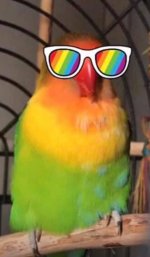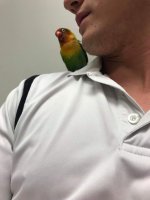Arsantiago41
New member
Hello all thank you for reading and responding to my post. It is truly appreciated. Unfortunately two days ago my little baby Lovebird, kiwi, was feeling sick and we quickly realized it was heavy Metal Poisoning. Fortunately we brought him to the vet immediately after we recognized his symptoms and thankfully he is doing much better day by day under the supervision of the veterinarian. I was wondering if any of you had any experience with this situation or have any advice to help us rehabilitate kiwi back to full health when he comes home? Unfortunately we could only keep him at the vets under supervision for two days with plans to come home tomorrow. We wanted to keep him there for as long as possible but the veterinarian expenses have already costed us $1,200 and we’re only college students, leaving us nearly broke.
Bio
Kiwi is a beautiful, friendly, and loving year and a half old lovie who has instantly created a bond with both my girlfriend and I. He has brought so much enjoyment to our lives and our only goal is to make him as happy as he can possibly be. He is an extremely active, healthy, and curious bird and loves to spend time with us as much as possible. All we want to do is to be in the best position possible to rehabilitate him back to full health and make him happy again.
Incident
Day 1
Kiwi being the chewer and explorer he is had found himself a new “toy”, a metal door hinge with paint on it which he ripped to shreds. Unfortunately by the time my girlfriend and I got home from work we had not recognized what he had done and had given him love and said goodnight to him and his reactions were his usual sleepy bird self. (Note: usually my girlfriend and I have opposite work schedules so that one of us is always home with the baby so we always keep him outside of his cage where he is happier and never creates any issues. We had bird proofed the whole room for his safety and had never thought something as obscure as a door hinge would be something he would chew on.) Well we had gone to bed and nearly a few hours later in the middle of the night, I had heard kiwi, moving around in his cage. I turned on the light to check on him and I had saw his feathers were ruffled and he generally looked weak. After a while he was continuously vomiting and excreting black poop. We looked for the source and had found he chewed on paint from a rusty door hinge. Immediately we looked to hydrate him and prepared our plans to bring him to the vet once it opened.
Day 1 Vets Office
Once the vet had opened he was quickly submitted and we told the doctor the source of the sickness. The doctor had noted the situation was very serious and gave us treatment options giving us an estimate of 50% chance of survival. We elected to give him the best possible treatment although it broke the bank for us. After diagnosing him they had realized he had ingested two small pieces of metal and gave him a chelating medicine, foreign body antibiotic, anti vomiting medicine, as well as fluids, feeding tube and an incubator. After a few hours of treatment they had advised us that kiwi has stopped vomiting and had noticeably improved his energy and general well being. The nurse noted he even ate a few seeds on his own.
Day 2
The veterinarian called us to tell us that kiwi is doing much better than when we had been submitted to the hospital. They noted he was still a bit depressed and had vomitted only once the prior night but had substantially an increase in his energy even hoping around and climbing on their cage. Later that day they gave us an update that he had not vomited at all that day, had looked better, and was much more active but still did not have much appetite and therefore had administered the feeding tube once again. After talking to the vetrinarian before nights end they had given a much better outlook on kiwis life expectancy which emotionally broke us down in joy and relief
Although we would like to keep him in the hospital as long as possible the bills had already racked up to $1200 which really broke the bank due to the fact that we are college students. If given the chance I would pay 10 grand for his treatment to ensure he recovers but we are forced to pick him up tomorrow and care for him ourselves. Thankfully the vets did an excellent job taking care of him and he is doing much better than when he arrived.
***As loving owners we are asking for your help to share any experience or advice that you have encountered with heavy Metal Poisoning or any sickness and what you did to care for your parrot during their recovery at home***
- tips on feeding/force feeding and hydrating when the parrot has no appetite to ensure they are well nourished
- things to look for hinting a deteriorating well being
- best conditions to keep the parrot under
- anything you feel is fitting to improve the health of the bird
- all comments are welcomed and greatly appreciated
I can’t stress enough how much we appreciate you taking the time to read this post and commenting and can’t thank you enough.
Bio
Kiwi is a beautiful, friendly, and loving year and a half old lovie who has instantly created a bond with both my girlfriend and I. He has brought so much enjoyment to our lives and our only goal is to make him as happy as he can possibly be. He is an extremely active, healthy, and curious bird and loves to spend time with us as much as possible. All we want to do is to be in the best position possible to rehabilitate him back to full health and make him happy again.
Incident
Day 1
Kiwi being the chewer and explorer he is had found himself a new “toy”, a metal door hinge with paint on it which he ripped to shreds. Unfortunately by the time my girlfriend and I got home from work we had not recognized what he had done and had given him love and said goodnight to him and his reactions were his usual sleepy bird self. (Note: usually my girlfriend and I have opposite work schedules so that one of us is always home with the baby so we always keep him outside of his cage where he is happier and never creates any issues. We had bird proofed the whole room for his safety and had never thought something as obscure as a door hinge would be something he would chew on.) Well we had gone to bed and nearly a few hours later in the middle of the night, I had heard kiwi, moving around in his cage. I turned on the light to check on him and I had saw his feathers were ruffled and he generally looked weak. After a while he was continuously vomiting and excreting black poop. We looked for the source and had found he chewed on paint from a rusty door hinge. Immediately we looked to hydrate him and prepared our plans to bring him to the vet once it opened.
Day 1 Vets Office
Once the vet had opened he was quickly submitted and we told the doctor the source of the sickness. The doctor had noted the situation was very serious and gave us treatment options giving us an estimate of 50% chance of survival. We elected to give him the best possible treatment although it broke the bank for us. After diagnosing him they had realized he had ingested two small pieces of metal and gave him a chelating medicine, foreign body antibiotic, anti vomiting medicine, as well as fluids, feeding tube and an incubator. After a few hours of treatment they had advised us that kiwi has stopped vomiting and had noticeably improved his energy and general well being. The nurse noted he even ate a few seeds on his own.
Day 2
The veterinarian called us to tell us that kiwi is doing much better than when we had been submitted to the hospital. They noted he was still a bit depressed and had vomitted only once the prior night but had substantially an increase in his energy even hoping around and climbing on their cage. Later that day they gave us an update that he had not vomited at all that day, had looked better, and was much more active but still did not have much appetite and therefore had administered the feeding tube once again. After talking to the vetrinarian before nights end they had given a much better outlook on kiwis life expectancy which emotionally broke us down in joy and relief
Although we would like to keep him in the hospital as long as possible the bills had already racked up to $1200 which really broke the bank due to the fact that we are college students. If given the chance I would pay 10 grand for his treatment to ensure he recovers but we are forced to pick him up tomorrow and care for him ourselves. Thankfully the vets did an excellent job taking care of him and he is doing much better than when he arrived.
***As loving owners we are asking for your help to share any experience or advice that you have encountered with heavy Metal Poisoning or any sickness and what you did to care for your parrot during their recovery at home***
- tips on feeding/force feeding and hydrating when the parrot has no appetite to ensure they are well nourished
- things to look for hinting a deteriorating well being
- best conditions to keep the parrot under
- anything you feel is fitting to improve the health of the bird
- all comments are welcomed and greatly appreciated
I can’t stress enough how much we appreciate you taking the time to read this post and commenting and can’t thank you enough.

